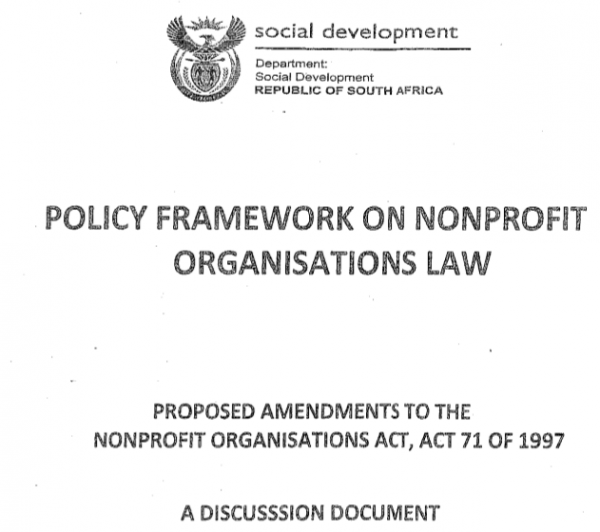New law to control civil society?

National government is taking steps to exert more control over civil society. In July, the Department of Social Development published a policy document for discussion titled “Policy Framework on Nonprofit Organisations Law”.
However, we can find no reports on this in the media. If it has been reported, it barely made a flutter. But the discussion document, which is still a draft but is publicly available, proposes far-reaching amendments to the law governing non-profit organisations, the Nonprofit Organisations Act of 1997. Several leading members of civil society we spoke to were unaware that the document existed until a few days ago and were not yet ready to comment on it. Unfortunately at the time of writing, some civil society members who are aware of the details appeared to be on end-of-year leave and we were unable to get a comment from them.
You can download the document here.
Currently the regulation of non-profit organisations is the responsibility of a directorate in the Department of Social Development (DSD). The document acknowledges that this directorate does not have the capacity to carry out its functions. It states that the current capacity must be increased by 42% to meet its duties, although how this figure is arrived at is not explained. Nevertheless, the document proposes a new structure which will have far wider powers and more work to do than the current directorate.
Most importantly, it proposes new institutions including, the South African Nonprofit Organisations Regulatory Authority (SANPORA) and the South African Nonprofit Organisations Tribunal (SANPOTRI). SANPORA, according to the document, “will have a mandate to encourage the formation of nonprofit organisations and their accountability through an efficient and effective registration facility that will create greater transparency and public confidence in the nonprofit sector.” Of concern to civil society is that the “relevant regulatory authority that supervises and monitors registered nonprofit organisations”, which is presumably SANPORA, “should have at least the right to examine books, records and activities of nonprofit organisations.”
SANOPTRI, on the other hand, will be independent from SANPORA. Its purpose will be to mediate between SANPORA and non-profit organisations. “Its decisions should be binding to all parties concerned,” says the document.
Richard Rosenthal is a lawyer who specialises in representing non-governmental organisations. He is deeply concerned about the policy document. “This thing needs to be debated. Civil society is a fragile and precious animal that needs to be protected particularly against government control such as we had under apartheid,” he remarked. He explained that under apartheid the state used the Fundraising Act and the Affected Organisations Act to ensure that “civil society was a lapdog.”
Rosenthal says that the prospect of new supervisory structures, such as SANPORA and SANOPTRI, being brought into being by appointment of the Minister of Social Development is concerning because non-governmental organisations should “not be made subject to the dictates or concerns of government.” He warned that when setting up a bureaucracy like the one proposed, “one has to tread wearily.” He said it is the “one who holds power [government] who has to be held to account.” Rosenthal compared the proposed control over civil society with government’s proposals to supervise the media.
It is not clear who the Department of Social Development consulted in the drafting of the document. Civil society organisations including the Treatment Action Campagn, Equal Education and PASSOP have not been consulted so far.
GroundUp phoned the Nonprofits Directorate in the DSD for comment. We also emailed the Directorate but received no reply by publication time.
Support independent journalism
Donate using Payfast

Don't miss out on the latest news
We respect your privacy, and promise we won't spam you.

This article is licensed under a Creative Commons Attribution-NoDerivatives 4.0 International License.
